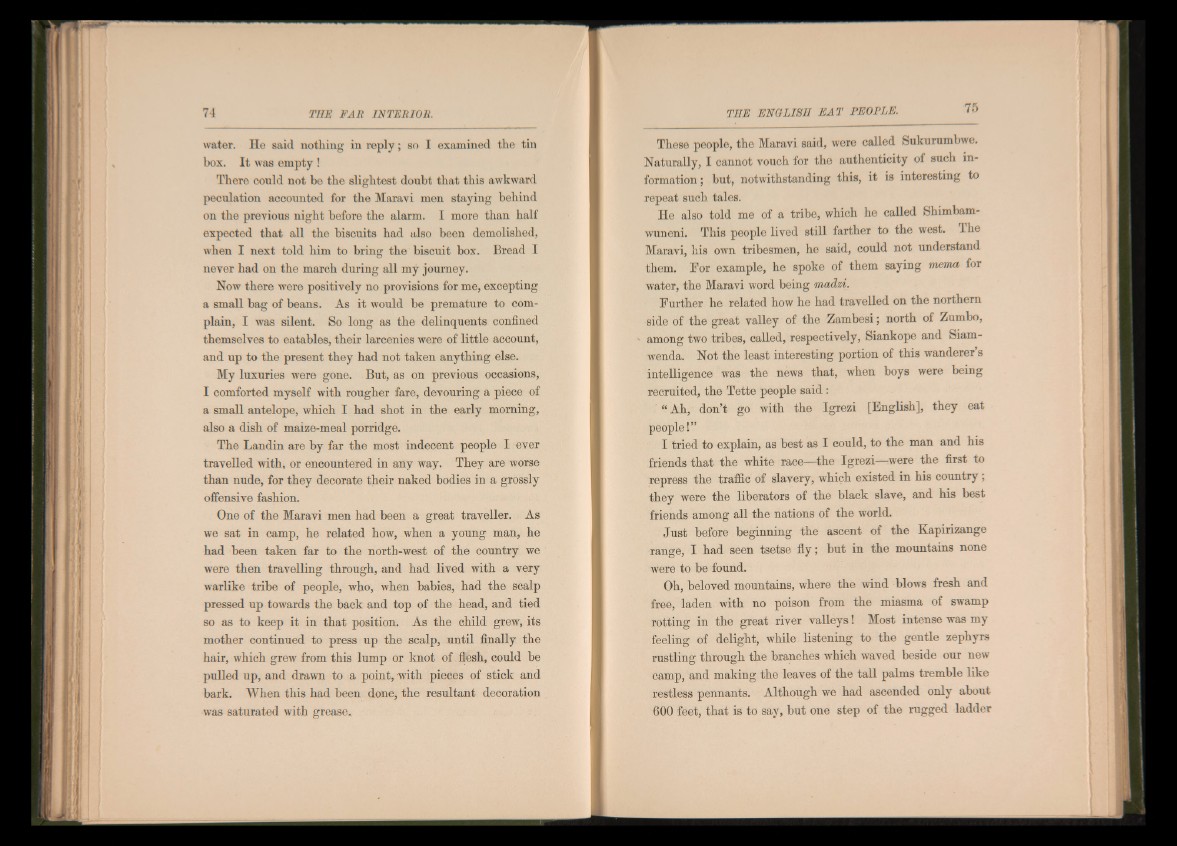
water. He said nothing in reply; so I examined the tin
box. I t was empty !
There could not be the slightest doubt that this awkward
peculation accounted for the Maravi men staying behind
on the previous night before the alarm. I more than half
expected that all the biscuits had also been demolished,
when I next told him to bring the biscuit box. Bread I
never had on the march during all my journey.
Now there were positively no provisions for me, excepting
a small bag of beans. As it would be premature to complain,
I was silent. So long as the delinquents confined
themselves to eatables, their larcenies were of little account,
and up to the present they had not taken anything else.
My luxuries were gone. But, as on previous occasions,
I comforted myself with rougher fare, devouring a piece of
a small antelope, which I had shot in the early morning,
also a dish of maize-meal porridge.
The Landin are by far the most indecent people I ever
travelled with, or encountered in any way. They are worse
than nude, for they decorate their naked bodies in a grossly
offensive fashion.
One of the Maravi men had been a great traveller. As
we sat in camp, he related how, when a young man, he
had been taken far to the north-west of the country we
were then travelling through, and had lived with a very
warlike tribe of people, who, when babies, had the scalp
pressed up towards the back and top of the head, and tied
so as to keep it in that position. As the child grew, its
mother continued to press up the scalp, until finally the
hair, which grew from this lump or knot of flesh, could be
pulled up, and drawn to a point, with pieces of stick and
bark. When this had been done, the resultant decoration
was saturated with grease.
These people, the Maravi said, were called Sukurumbwe.
Naturally, I cannot vouch for the authenticity of such information
; but, notwithstanding this, it is interesting to
repeat such tales.
He also told me of a tribe, which he called Shimbam-
wuneni. This people lived still farther to the west. The
Maravi, his own tribesmen, he said, could not understand
them. For example, he spoke of them saying metna for
water, the Maravi word being madzi.
Further he related how he had travelled on the northern
side of the great valley of the Zambesi; north of Zumbo,
among two tribes, called, respectively, Siankope and Siam-
wenda. Not the least interesting portion of this wanderer’s
intelligence was the news that, when boys were being
recruited, the Tette people said :
* Ah, don’t go with the Igrezi [English], they eat
people!”
I tried to explain, as best as I could, to the man and his
friends that the white race—the Igrezi—were the first to
repress the traffic of slavery, which existed in his country ;
they were the liberators of the black slave, and his best
friends among all the nations of the world.
Just before beginning the ascent of the Kapirizange
range, I had seen tsetse fly; but in the mountains none
were to be found.
Oh, beloved mountains, where the wind blows fresh and
free, laden with no poison from the miasma of swamp
rotting in the great river valleys! Most intense was my
feeling of delight, while listening to the gentle zephyrs
rustling through the branches which waved beside our new
camp, and making the leaves of the tall palms tremble like
restless pennants. Although we had ascended only about
600 feet, that is to say, but one step of the rugged ladder